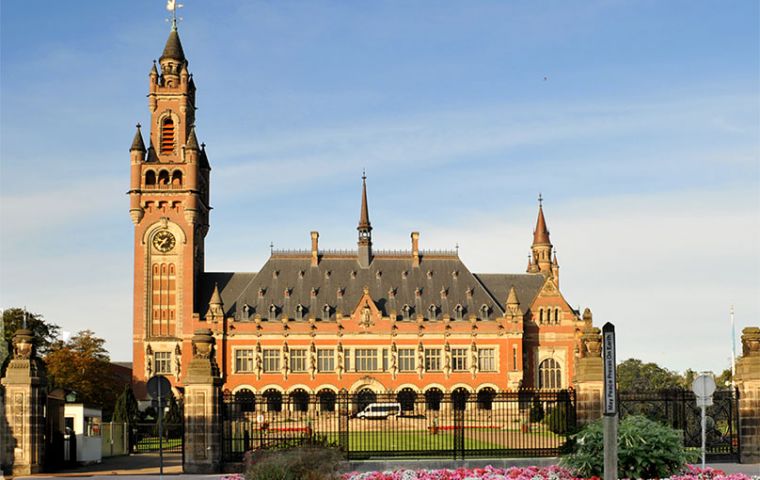MercoPress. South Atlantic News Agency
Slovenia wins legal territorial dispute against Croatia in The Hague
 The disputed waters, which belonged to the former Yugoslavia before its disintegration, were claimed by both countries.
The disputed waters, which belonged to the former Yugoslavia before its disintegration, were claimed by both countries. A Court of Arbitration in The Hague Thursday ruled in favour of Slovenia in its legal dispute with Croatia and ordered that the maritime border between the two countries be modified in the coming months. The decision has not been accepted by Zagreb.
The biggest dispute was the Bay of Piran in the Gulf of Trieste, whose waters, which belonged to the former Yugoslavia before its disintegration, were claimed by both countries.
The court unanimously decided that more than three-quarters of these waters should belong to Slovenia, against Croatia's stand that they divided in half.
The judges showed a map which states that the maritime border is a continuation of the Odoric canal, which is a mouth of the river Dragonja, situated in Slovenian territory.
Both the “fishing regulations” and “police patrols” that Croatia and Slovenia carry out in the area were taken into consideration to reach the court's decision, Presiding Justice Gilbert Guillaume said.
Slovenia had also demanded that the court grant it access to “high seas” in the Mediterranean so as not to be cloistered between Italy and Croatia because its current coast is only 47 kilometers long.
The judges established that the term “high seas” can not be used in the Mediterranean by any State in the sense that a country establishes in it an Exclusive Economic Zone.
However, some of the arguments put forward by Slovenia were heard and an “Area of Union,” eas established. It is a maritime space in the Adriatic Sea currently under Croatia's sole control to which both countries will be entitled.
This “Union Area” would be 2.5 nautical miles from north to south and almost 10 from east to west.
Regarding land border disputes, both countries agreed on where to establish more than 90% of the borderline between the two, but there were differences in some specific regions.
In most of these cases the court followed the boundaries recorded by both Slovenian and Croatian cadastres, as in the case of the Drago area, the Mura river or others in the central region.
Croatia has not recognised the court's authority for two years and it was not represented at The Hague on Thursday. In 2015 Croatia withdrew unilaterally from the arbitration priceedings after transcripts of several talks between a Slovenian member of the Court and officials from Slovenian were released by Croatian media.
Zagreb has since maintained the ruling had been unlawfully influenced and already decided.
The Slovenian judge involved in the case and an official of that country resigned and the same court recognized in 2016 that the Slovenian party had violated some provisions of the arbitration agreement, but not to the extent that the proceedings had to be suspended.
Guillaume recalled Thursday that the agreement signed in 2009 by both countries stated in writing that “the court's decision will be binding” and that the parties would take “the necessary steps to implement it.”




Top Comments
Disclaimer & comment rules-

-

Read all commentsI suppose that either side could respond to perceived bullying by shutting down their common border in a form of economic warfare. This will shut off billions of dollars of commerce, effecting Europe and the southern Balkans even worse. It could a have a major impact on Bosnia. Should a Slovenian-Croatian order shut down hurt Bosnia's ability to receive goods from Northern Europe, it will have to do one of two choices. goods will have to be shipped through eastern Slovenia, into Hungary, down into Serbia's Vojvodina province, and into Bosnia through the Srpska region. This will give the Bosnian Serbs considerable leverage. Croatia ends up being the big loser in this outcome. To offset this, Bosnia will have to use its Nuem port. However, this area of the Bosnian-Croat federation is predominantly Croat, making the Muslim Bosniak's a little nervous about relying on the shipping of their goods exclusively through Croat regions. The result may be renewed Muslim Croat tensions. If Croatia decides to disrupt Slovenia's efforts toward circumventing commerce by spurring agitation in Vojvodina, the Croats had better be prepared to respond to Hungarian pressure as well as Serbian pressure. Not sure why Croatia thinks this is worth it so much. It will get real sensitive if additional hydrocarbons are found in the Adriatic. Brian Ghilliotti
Jun 30th, 2017 - 10:58 pm +1Hepatia
Jun 30th, 2017 - 01:10 pm 0I have posed this question to YOU
The question is why is this piece appearing in Mercopenguin, a propaganda organ supposedly devoted to America, South America and the “South Atlantic”?
Why have you not posted your Troll bot for this?
Commenting for this story is now closed.
If you have a Facebook account, become a fan and comment on our Facebook Page!